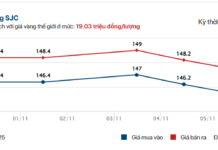At the Workshop on Contributing to and Perfecting the Population Law and Suggesting Population Transition Policies for Asian-Pacific Economies, held on August 6 in Hanoi, Prof. Dr. Nguyen Thien Nhan – Member of the 15th National Assembly; former Politburo member and former Hanoi Party Secretary, offered 11 solutions for sustainable population and national development, and happy families and citizens.
To ensure that each family can have two children, Prof. Nhan suggested that the income of a family with two working adults should be enough to support four people (two adults and two children). The government, businesses, and labor unions need to unite in their understanding and solutions so that families with two working members can have sufficient income to support and educate their two children properly.
He proposed transitioning from a minimum wage policy to a policy that ensures a livable minimum wage for a family of four.

Prof. Dr. Nguyen Thien Nhan contributes ideas to perfect the Population Law
Secondly, the working hours of employees should be short enough (8 hours per day, 40 hours per week) to allow them time to find a life partner, care for their children and family, and pursue personal interests.
Thirdly, there should be a competitive housing market with state support and supervision so that employees can rent or buy affordable housing. This would ensure that a lack of housing does not become an insurmountable obstacle to getting married.
Fourthly, working conditions, maternity leave policies, salary, and promotion opportunities in enterprises should encourage marriage and childbirth without creating a conflict between work and family life.
Fifthly, early childhood education (for children aged 3 months to 5 years) should be universal to enable parents to work and develop their careers even after childbirth and while their children are young. There should be a development of public and private education systems to ensure universal primary, lower secondary, and vocational education.
Sixthly, there should be a sharing of responsibilities between wives and husbands in household chores, child-rearing, and the realization of true gender equality.
Seventhly, a social environment friendly to children, mothers, and families should be built, reflecting society’s appreciation for those who fulfill their civic responsibilities for the country’s sustainable development in terms of labor and population.
Eighthly, teaching about how to be a happy spouse and parent and how to build a happy family should be included in the curriculum from secondary school to vocational education. There should be a subject on the Happiness Studies of the Vietnamese people at all educational levels.
Ninthly, it is essential to promote the cultural traditions of the Vietnamese people and local community initiatives so that marriage and childbirth bring irreplaceable happiness to life and are a source of pride in fulfilling civic responsibilities.
Tenthly, the state should have practical programs to support infertile couples in having children.
Finally, families should have the autonomy to decide the number and timing of children. There should be a development of a counseling, healthcare, and reproductive support system.
According to Prof. Nhan, population management currently faces many difficulties and challenges, with emerging practical issues directly impacting the country’s sustainable development. The replacement-level fertility rate is not truly sustainable. The average number of children per woman of childbearing age is 1.96, the lowest in history, and is expected to continue declining.
The reason for the declining birth rate is the trend towards late marriage, with many people choosing to remain single. In Ho Chi Minh City, for example, the average age at first marriage is 30.4 years, a record high in Vietnam, contributing to the low birth rate and accelerating population aging. The reasons for late or non-marriage include preoccupation with work, financial difficulties, career pursuits, and a desire for freedom. Additionally, young people are reluctant to marry due to the influence of stories of family breakdowns and the lack of ideal role models…
“If there are no breakthrough changes in economic, social, and population policies, Vietnam’s total fertility rate will continue to decline deeply and persist for a long time,” said Prof. Nhan, as he proposed various policies and solutions to encourage childbirth.
Currently, the Ministry of Health is drafting the Population Law and seeking feedback. In this draft, the Ministry proposes removing the regulation that a couple should only have 1-2 children and giving couples the right to decide the number, timing, and spacing of children.
Nguyen Phuong








































